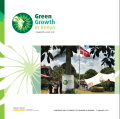A Schumpeterian case can be made for boosting Green Growth in a global economic crisis. The best way to achieve this is a combination of R&D subsidies to redirect growth from polluting to clean economic activities and a credible, rising carbon tax to speed up the transition to the carbon-free era. If a carbon tax is infeasible, renewables subsidies might be a second-best alternative to reduce the duration of the fossil fuel era and curb cumulative carbon emissions despite some adverse, short-run Green Paradox effects.
For the next fifty years and beyond, the world faces twin challenges:
-Enhancing economic opportunities and living standards for a growing global population;
-Addressing the environmental threats that, if left largely unaddressed, could undermine the world's abilities for longer term economic growth and development and the ability to reduce poverty.
For twenty years the world community has attempted to face up to these challenges, notably global warming by a “top down” international negotiation process under the auspices of the UN Framework Convention on Climate Change (UNFCCC). The paper discusses why this process has failed so far.
To escape this impasse, a “bottom up” policy framework for green growth based on national preferences, possibilities and policies should be considered and is discussed in some detail.
However, while green growth may enhance the transition towards low-carbon economies in the short – and medium term, it is argued that a “Global Green Deal” with regional and global rules of the game is needed to reduce the risk for unsustainable development in the longer term.
This report summarises the main findings of a study on the scale and distribution of green employment in the economy of Bangladesh. It contributes to the ongoing work of the ‘Green Jobs Initiative’ in the country. A GHK report for the ILO

On 31 January 2011, the Embassy of Denmark in Nairobi brought together ministers, national and international business leaders, policy-makers and representatives from international financial institutions at a high-level conference to discuss how the private sector in Kenya can lead on Green Growth. The conclusions from the conference can be found in this report and aim at contributing to establish the necessary regulatory and financial framework and set priorities for green investments in Kenya.
International trade in environmental goods and services (EGS) may contribute to the achievement of environmental, economic and developmental benefits and to the transition towards a “green economy”. The international community has been exploring several strategies to promote sustainable development through enhanced trade in EGS. One key question remains how to maximise the sustainable benefits of trade liberalisation and market creation/expansion of EGS for developing countries. This paper seeks to explore the possible role of trade preferences for EGS in promoting the transition towards a “green economy”, focusing on potential beneficial effects for developing countries.
